Mississippi Today
Joe Burrow has deep roots (and quite the gene pool) in Amory, Mississippi
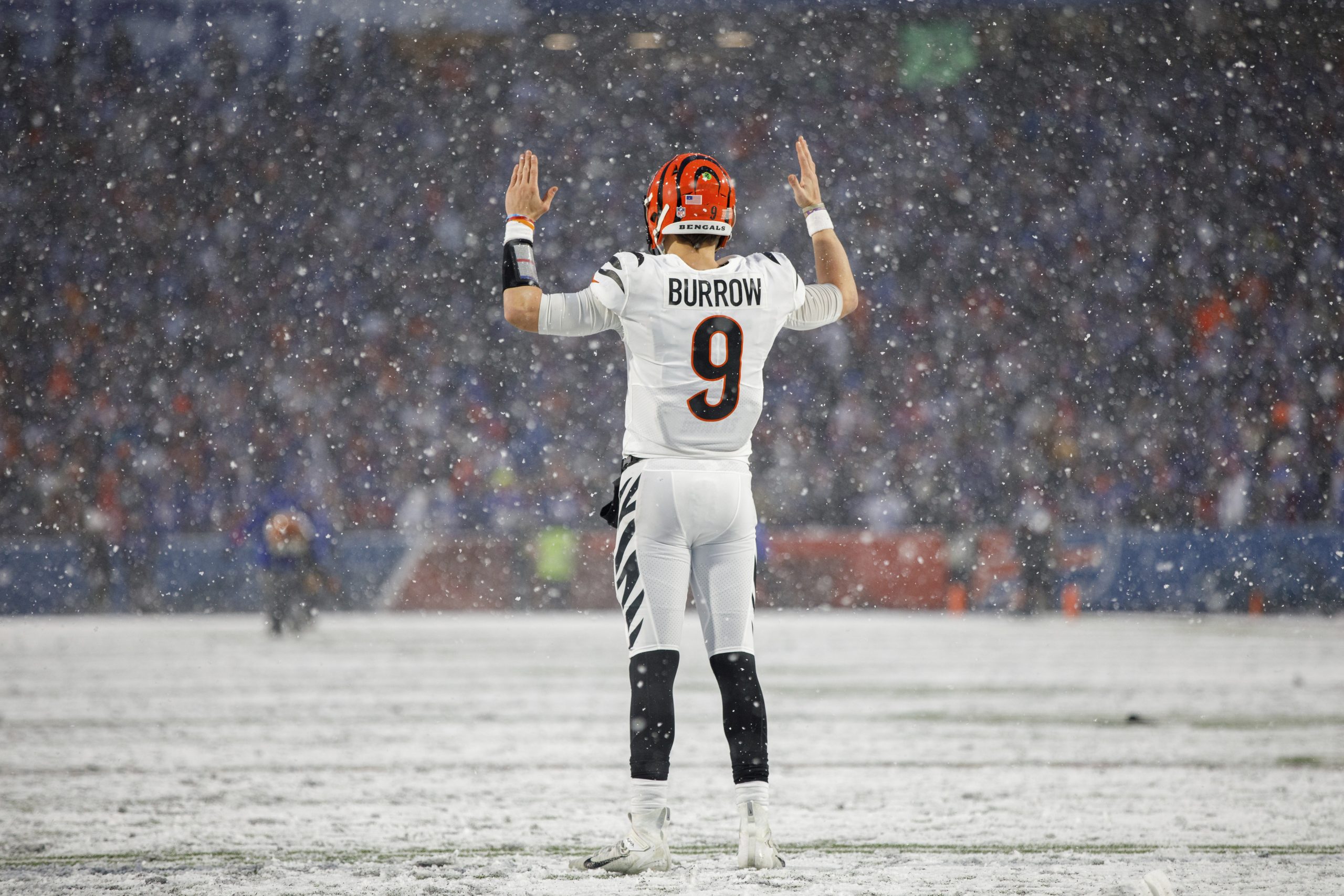
Joe Burrow has deep roots (and quite the gene pool) in Amory, Mississippi
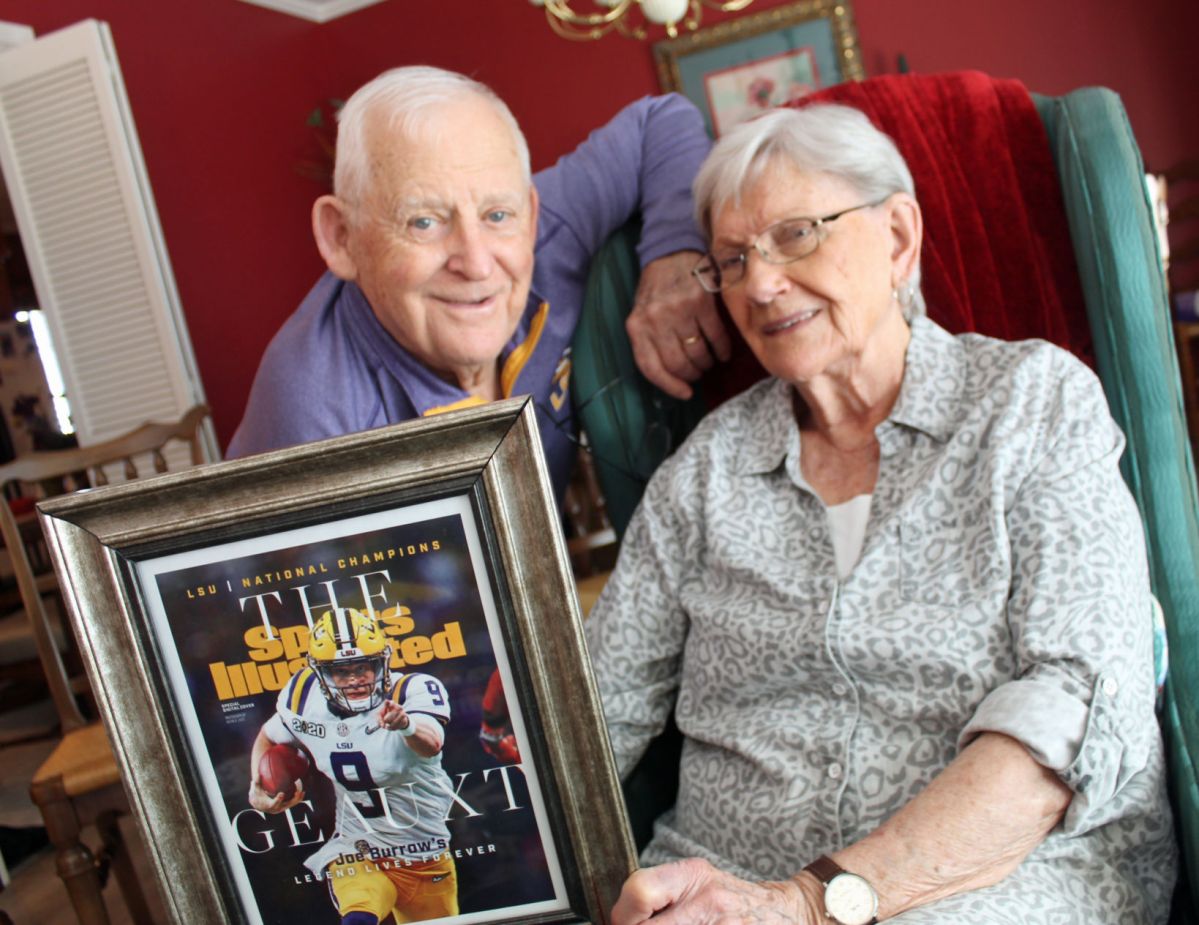
Joe Burrow, the superb Cincinnati Bengals quarterback, inherited much of his remarkable athletic ability from a northeast Mississippi gene pool on his father’s side of the family.
His dad, Amory native Jimmy Burrow, was an all-star safety on a Nebraska national championship team after walking on at Ole Miss and then transferring to the Cornhuskers. His uncle, Johnny Burrow, was a starting safety at Ole Miss. His grandfather, James, was the starting point guard for Mississippi State basketball in the early 1950s.

That’s a lot, but that’s not all. His grandmother, Dot Burrow (the former Dot Ford) once scored a state record 82 points in a high school basketball game for Smithville, six miles up the road from Amory, and averaged 49.5 points a game for an entire 30-game season.
In fact, when someone mentioned that Kobe Bryant once scored 81 points in a game for the Los Angeles Lakers, Joe Burrow quipped, “Yeah, but Kobe’s still one short of my grandma.”
Late Sunday afternoon, James Burrow, 92, and Dot Burrow, 91, will watch the grandson they still call “Joey” and the Bengals take on the Kansas City Chiefs from their living room in Amory, where they watch all his games.
“Joey has told us he’ll send a jet to fly us to the games,” James Burrow said Tuesday by telephone. “I told him, ‘But, Joey, we’re too old to do all that walking, especially up all those steps.’ So Joey said we wouldn’t have to walk and that we can take an elevator up to his private suite. The truth is, we’d just rather watch here. That’s a lot of travel when you’re our age.”
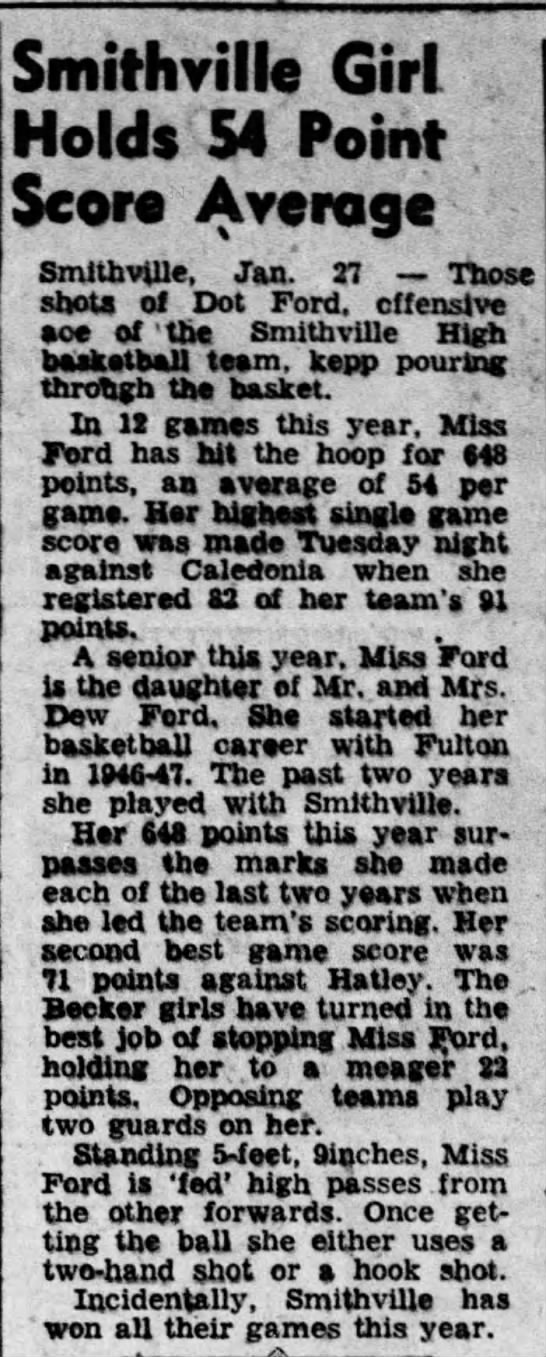
Both of Joe Burrow’s paternal grandparents were fine athletes in their day — as James puts it, “back in the dark ages.” James Burrow walked on at Mississippi State and became a two-year basketball starter at point guard for Mississippi Sports Hall of Famer Paul Gregory. He averaged 10 points per game, third highest on the team, as a senior. But James will be the first to tell you his high school sweetheart, Dot, was the better basketball player.
“When I was at State, I told all my teammates about my girlfriend back in Smithville who was averaging 50 points a game,” James Burrow said. “Nobody believed me, so I took a couple of them to a game when Smithville played near Starkville in Hamilton. Well, she scored 72 that night.”
A few nights later, nearly the entire State team went to nearby Caledonia to watch the amazing Dot Ford. “That was the night she scored 82, breaking her own state record,” James Burrow said.
Asked whether he ever played his future wife in a game of H-O-R-S-E, James Burrow chuckled and answered, “Oh no, I didn’t want to mess with her.”
Years later, James Burrow was involved in Mississippi sports history in another way. He was the Amory schools administrator who hired high school football coaching legend Bobby Hall as the head football coach at Amory High.
“When he interviewed, I warned him, ‘Bobby, our cupboard is bare. You might not win a game,’” James Burrow recalled. “Bobby said, ‘If you hire me I guarantee you we’ll win more than we lose.’ Well, he won seven that first year.”
Two Amory state championships followed. Bobby Hall went on to win 309 games as a coach. Yes, and when Southern Miss head coach Will Hall (Bobby’s son) attended his first day of school in kindergarten in Amory, Dot Burrow drove the yellow school bus that delivered him to his dad’s football practice that afternoon.
“The Burrows are salt of the earth, good as gold,” Bobby Hall said.
James and Dot Burrow haven’t always been too old to travel to watch grandson Joey play. During summers, they would travel to Athens, Ohio, and watch him play Little League baseball and summer league basketball. Said James, “Joey could hit the baseball a mile and field every position. In basketball, he could shoot it from anywhere on the court. He played varsity in the ninth grade. He played varsity in the ninth grade in football, too, both offense and defense, but when they went to the spread offense in his 10th grade season, he really took off.”
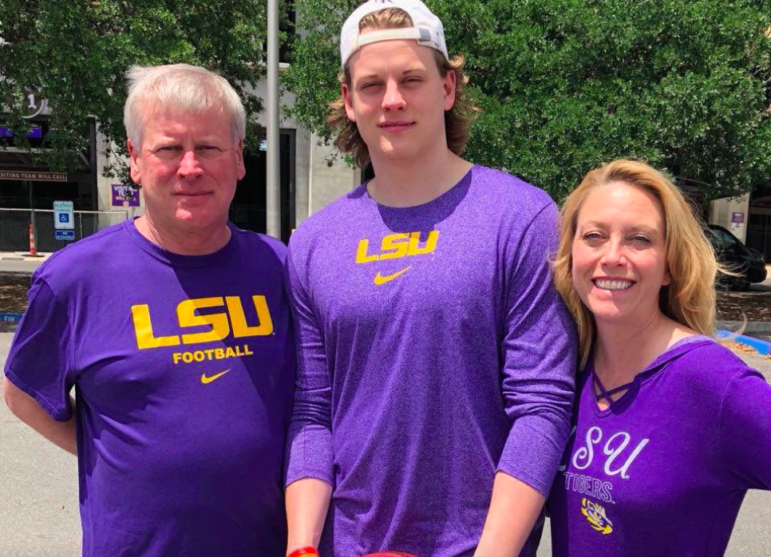
Most football fans know the rest of the Joe Burrow story. He was the Ohio Gatorade Player of the Year as a senior and signed with Ohio State. He transferred to LSU in 2018 and led the Tigers to the national championship and a 15-0 record in 2019, throwing for seven touchdowns in a semifinal victory over Oklahoma and six touchdowns in the national championship game against Clemson. That’s perhaps the equivalent of scoring 82 points in a 32-minute high school basketball game.
That 2019 season, Burrow threw for 60 touchdowns, while throwing just six interceptions. Said Archie Manning, who knows the Burrow family well, “I really believe that’s the best season any quarterback ever had and probably ever will have.”
It is difficult to imagine a better one. Naturally, Joe Burrow was the first pick of the 2020 NFL Draft. Through three NFL seasons, Joe Burrow has thrown for nearly 12,000 yards and 82 touchdowns. With the situation calls for it, he runs for crucial first downs as well. His original NFL contract called for $36 million over four years, but he becomes eligible for a contract extension this off-season. The Bengals would be fools to not to act on it. They will need a calculator with fresh batteries.
Needy children in Ohio and Louisiana will surely benefit, as they already have. The Joe Burrow Foundation, founded just last fall, already as already donated $200,000 toward helping children facing food insecurity and mental health issues.
Said James Burrow of his grandson’s passion for helping children who desperately need help, “We’re proud of Joey for a lot of reasons, especially that.”
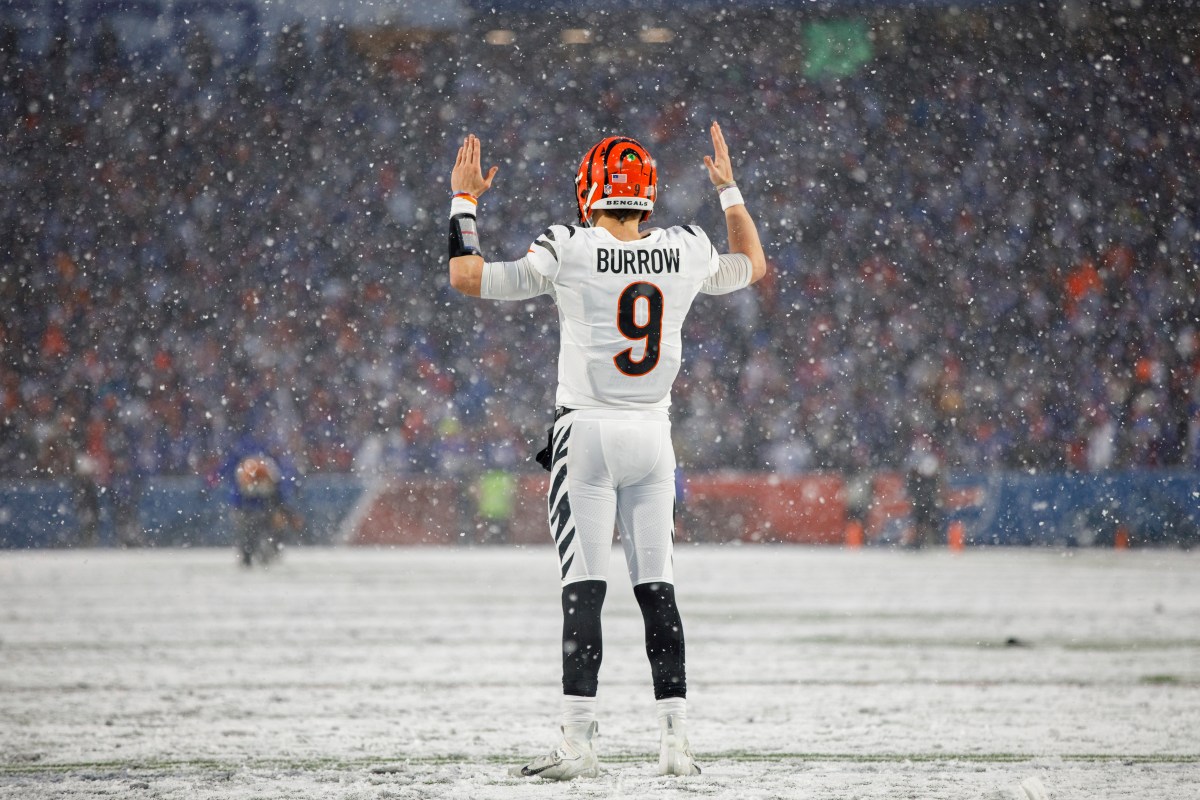
This article first appeared on Mississippi Today and is republished here under a Creative Commons license.
Mississippi Today
1964: Mississippi Freedom Democratic Party was formed
April 26, 1964

Civil rights activists started the Mississippi Freedom Democratic Party to challenge the state’s all-white regular delegation to the Democratic National Convention.
The regulars had already adopted this resolution: “We oppose, condemn and deplore the Civil Rights Act of 1964 … We believe in separation of the races in all phases of our society. It is our belief that the separation of the races is necessary for the peace and tranquility of all the people of Mississippi, and the continuing good relationship which has existed over the years.”
In reality, Black Mississippians had been victims of intimidation, harassment and violence for daring to try and vote as well as laws passed to disenfranchise them. As a result, by 1964, only 6% of Black Mississippians were permitted to vote. A year earlier, activists had run a mock election in which thousands of Black Mississippians showed they would vote if given an opportunity.
In August 1964, the Freedom Party decided to challenge the all-white delegation, saying they had been illegally elected in a segregated process and had no intention of supporting President Lyndon B. Johnson in the November election.
The prediction proved true, with white Mississippi Democrats overwhelmingly supporting Republican candidate Barry Goldwater, who opposed the Civil Rights Act. While the activists fell short of replacing the regulars, their courageous stand led to changes in both parties.
This article first appeared on Mississippi Today and is republished here under a Creative Commons Attribution-NoDerivatives 4.0 International License.![]()
Mississippi Today
Mississippi River flooding Vicksburg, expected to crest on Monday
Warren County Emergency Management Director John Elfer said Friday floodwaters from the Mississippi River, which have reached homes in and around Vicksburg, will likely persist until early May. Elfer estimated there areabout 15 to 20 roads underwater in the area.
“We’re about half a foot (on the river gauge) from a major flood,” he said. “But we don’t think it’s going to be like in 2011, so we can kind of manage this.”
The National Weather projects the river to crest at 49.5 feet on Monday, making it the highest peak at the Vicksburg gauge since 2020. Elfer said some residents in north Vicksburg — including at the Ford Subdivision as well as near Chickasaw Road and Hutson Street — are having to take boats to get home, adding that those who live on the unprotected side of the levee are generally prepared for flooding.



“There are a few (inundated homes), but we’ve mitigated a lot of them,” he said. “Some of the structures have been torn down or raised. There are a few people that still live on the wet side of the levee, but they kind of know what to expect. So we’re not too concerned with that.”
The river first reached flood stage in the city — 43 feet — on April 14. State officials closed Highway 465, which connects the Eagle Lake community just north of Vicksburg to Highway 61, last Friday.

Elfer said the areas impacted are mostly residential and he didn’t believe any businesses have been affected, emphasizing that downtown Vicksburg is still safe for visitors. He said Warren County has worked with the U.S. Army Corps of Engineers and the Mississippi Emergency Management Agency to secure pumps and barriers.
“Everybody thus far has been very cooperative,” he said. “We continue to tell people stay out of the flood areas, don’t drive around barricades and don’t drive around road close signs. Not only is it illegal, it’s dangerous.”
NWS projects the river to stay at flood stage in Vicksburg until May 6. The river reached its record crest of 57.1 feet in 2011.




This article first appeared on Mississippi Today and is republished here under a Creative Commons Attribution-NoDerivatives 4.0 International License.![]()
Mississippi Today
With domestic violence law, victims ‘will be a number with a purpose,’ mother says
Joslin Napier. Carlos Collins. Bailey Mae Reed.
They are among Mississippi domestic violence homicide victims whose family members carried their photos as the governor signed a bill that will establish a board to study such deaths and how to prevent them.
Tara Gandy, who lost her daughter Napier in Waynesboro in 2022, said it’s a moment she plans to tell her 5-year-old grandson about when he is old enough. Napier’s presence, in spirit, at the bill signing can be another way for her grandson to feel proud of his mother.
“(The board) will allow for my daughter and those who have already lost their lives to domestic violence … to no longer be just a number,” Gandy said. “They will be a number with a purpose.”
Family members at the April 15 private bill signing included Ashla Hudson, whose son Collins, died last year in Jackson. Grandparents Mary and Charles Reed and brother Colby Kernell attended the event in honor of Bailey Mae Reed, who died in Oxford in 2023.
Joining them were staff and board members from the Mississippi Coalition Against Domestic Violence, the statewide group that supports shelters and advocated for the passage of Senate Bill 2886 to form a Domestic Violence Facility Review Board.
The law will go into effect July 1, and the coalition hopes to partner with elected officials who will make recommendations for members to serve on the board. The coalition wants to see appointees who have frontline experience with domestic violence survivors, said Luis Montgomery, public policy specialist for the coalition.
A spokesperson from Gov. Tate Reeves’ office did not respond to a request for comment Friday.
Establishment of the board would make Mississippi the 45th state to review domestic violence fatalities.
Montgomery has worked on passing a review board bill since December 2023. After an unsuccessful effort in 2024, the coalition worked to build support and educate people about the need for such a board.
In the recent legislative session, there were House and Senate versions of the bill that unanimously passed their respective chambers. Authors of the bills are from both political parties.
The review board is tasked with reviewing a variety of documents to learn about the lead up and circumstances in which people died in domestic violence-related fatalities, near fatalities and suicides – records that can include police records, court documents, medical records and more.
From each review, trends will emerge and that information can be used for the board to make recommendations to lawmakers about how to prevent domestic violence deaths.
“This is coming at a really great time because we can really get proactive,” Montgomery said.
Without a board and data collection, advocates say it is difficult to know how many people have died or been injured in domestic-violence related incidents.
A Mississippi Today analysis found at least 300 people, including victims, abusers and collateral victims, died from domestic violence between 2020 and 2024. That analysis came from reviewing local news stories, the Gun Violence Archive, the National Gun Violence Memorial, law enforcement reports and court documents.
Some recent cases the board could review are the deaths of Collins, Napier and Reed.
In court records, prosecutors wrote that Napier, 24, faced increased violence after ending a relationship with Chance Fabian Jones. She took action, including purchasing a firearm and filing for a protective order against Jones.
Jones’s trial is set for May 12 in Wayne County. His indictment for capital murder came on the first anniversary of her death, according to court records.
Collins, 25, worked as a nurse and was from Yazoo City. His ex-boyfriend Marcus Johnson has been indicted for capital murder and shooting into Collins’ apartment. Family members say Collins had filed several restraining orders against Johnson.
Johnson was denied bond and remains in jail. His trial is scheduled for July 28 in Hinds County.
He was a Jackson police officer for eight months in 2013. Johnson was separated from the department pending disciplinary action leading up to immediate termination, but he resigned before he was fired, Jackson police confirmed to local media.
Reed, 21, was born and raised in Michigan and moved to Water Valley to live with her grandparents and help care for her cousin, according to her obituary.
Kylan Jacques Phillips was charged with first degree murder for beating Reed, according to court records. In February, the court ordered him to undergo a mental evaluation to determine if he is competent to stand trial, according to court documents.
At the bill signing, Gandy said it was bittersweet and an honor to meet the families of other domestic violence homicide victims.
“We were there knowing we are not alone, we can travel this road together and hopefully find ways to prevent and bring more awareness about domestic violence,” she said.
This article first appeared on Mississippi Today and is republished here under a Creative Commons Attribution-NoDerivatives 4.0 International License.
-

 News from the South - Florida News Feed6 days ago
News from the South - Florida News Feed6 days agoJim talks with Rep. Robert Andrade about his investigation into the Hope Florida Foundation
-

 News from the South - Alabama News Feed5 days ago
News from the South - Alabama News Feed5 days agoPrayer Vigil Held for Ronald Dumas Jr., Family Continues to Pray for His Return | April 21, 2025 | N
-

 Mississippi Today5 days ago
Mississippi Today5 days ago‘Trainwreck on the horizon’: The costly pains of Mississippi’s small water and sewer systems
-

 News from the South - Texas News Feed5 days ago
News from the South - Texas News Feed5 days agoMeteorologist Chita Craft is tracking a Severe Thunderstorm Warning that's in effect now
-

 News from the South - Florida News Feed4 days ago
News from the South - Florida News Feed4 days agoTrump touts manufacturing while undercutting state efforts to help factories
-

 News from the South - Virginia News Feed5 days ago
News from the South - Virginia News Feed5 days agoTaking video of military bases using drones could be outlawed | Virginia
-

 News from the South - Texas News Feed7 days ago
News from the South - Texas News Feed7 days agoNo. 3 Texas walks off No. 9 LSU again to capture crucial SEC softball series
-

 News from the South - Florida News Feed4 days ago
News from the South - Florida News Feed4 days agoFederal report due on Lumbee Tribe of North Carolina’s path to recognition as a tribal nation














































